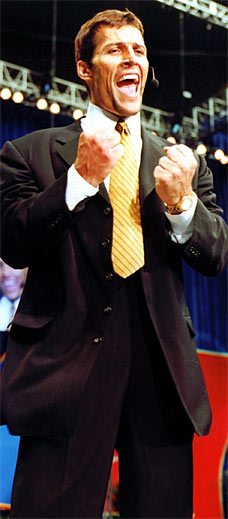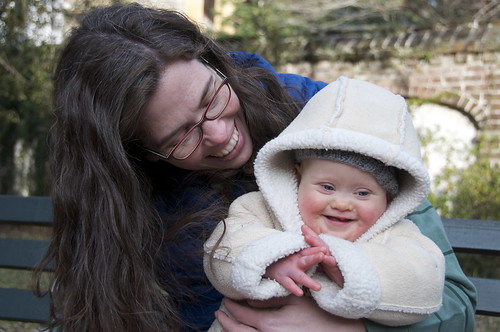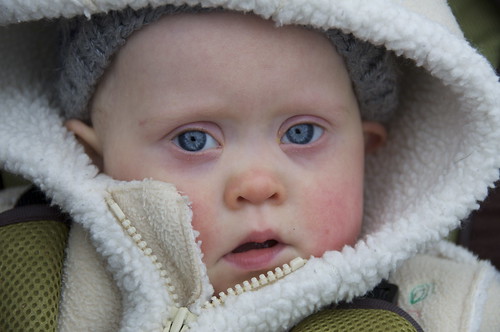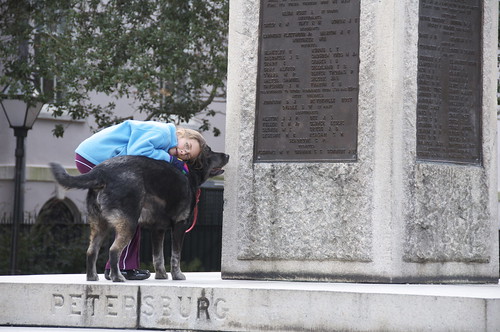A friend reminded me recently that I haven't let Baxter Sez readers know about the date of the surgery. It's going to be Feb. 12. We'll be in the Durham area from Feb. 11 through probably Feb. 19. Now I feel the voice of my internalized father warning, "You don't tell people when you're going to be out of town! They might rob the house!"--so please be aware that people will be in our house the whole time we're gone.
1.28.2010
1.27.2010
Reconstructing Motherhood and Disability
Landsman interviewed women who were mothers of children with disabilities; she interviewed them fairly shortly after the diagnosis, and then a year later. Her findings were really interesting, and her interpretation of the interviews struck me as sensitive, nuanced, respectful, and revealing. She herself is the mother of a daughter with a disability, which seems clearly to have aided her scholarship. And, indeed, this is one of her points that I found most compelling: she suggests that “what mothers of disabled children have come to know can be used to further our understanding of humanity and to promote the expression and experience of full lives for all people” (173). She presents these mothers as theorists, not as victims or as “special mothers chosen for these special children”—familiar models in public discourse—but as knowledge producers. Through their intimate, loving relationships with their children, these mothers have developed a critical stance on mainstream culture.
She doesn’t just unequivocally celebrate the mothers she interviews. She notes that many of the mothers’ actions are aligned with a medicalized perspective on disability, one that views the disability as something separate from the actual child, and that proposes that the problem is with the child, not with the larger society. With great sympathy and her own personal reflections, she questions the idea of “the cure” and some mothers’ desire to fix their children, or to change their children so that the children are as much as possible aligned with mainstream cultural norms and expectations. Those in disability studies and the disability rights movement argue that the goal should be to change the culture itself, not to change the “faulty” individual. They challenge the very notion of the faulty individual and argue—very convincingly—that disability is culturally constructed, and that much of the suffering attendant on disability is societally created. But Landsman notes that even as they utilize parts of the medical paradigm, most of the mothers also challenge it. And many of them come to embrace a potentially radical perspective, one not out of line with disability rights activism:
[A] number of mothers in the study describe a personal transformation in terms not only of rejecting the binary of normal/abnormal, but of embracing the very qualities in their child that are labeled by society as abnormal. The child’s impairment is in this interpretation not relegated exclusively to a biology separate from the self, but rather is understood as integral to the child and infused with meaning. (207)Furthermore, she argues that these mothers are reinventing motherhood as they go, that they’re offering new ways of understanding dependence and interdependence and that they’re developing new models for making visible the value of their children. She also examines some of the ways that feminist discourse hasn’t taken these women, or their children, into account. She offers a brief but revealing discussion of prenatal testing and abortion. She shows the ways that her interviewees are challenging and changing the pliable notion of personhood—who counts as a full or “real” person and why.
On the whole, this is an excellent book, a must read for any medical personnel who deal with parents of children with disabilities, and of interest to anyone who’s studying motherhood or disability. And for anyone who’s both a scholar and a parent of a child with a disability, I think you’ll find this hard to put down.
1.26.2010
More on my conversation with my neurosurgeon
Another topic of conversation that came up with my neurosurgeon the other day was the surgery itself. It'll take 4-6 hours, and I will be awake for most of it. My NS will be mapping my brain by probing around and asking me questions. Yes, that's right: while he's operating on my brain, I'll be having to talk and answer questions so that he knows what to take out and what not to take out. This is, of course, a very, very good idea, and I'm all for him not taking out important things. But still--quite disturbing.
I asked, "Will I remember it?"
He said, "Of course!"
Then I asked, "Will I be given any valium, or anything to relax me, to make sure I don't freak out?"
He said, "No. We don't want to give you anything that might interfere with the mapping."
"So I'll be wide awake, with nothing to relax me. What's to keep me from freaking out?"
"You won't freak out."
"I don't know--that sounds pretty freaky!"
He was absolutely confident. "You won't freak out."
"How do you know?"
"You aren't one of the first 500 people I've done this procedure on. You won't freak out."
You know, he sounded so sure of this, that I almost believe him. We'll find out--since I'll remember it all, I'll have some good stories to tell when it's all over.
1.22.2010
My neurosurgeon
 I'm beginning to characterize my neurosurgeon as a lovable curmudgeon. He is absolutely one of the best in the world at what he does, and he's quite personable and very professional (although my friend Eliza worries about his mo hygiene--when did we start calling mustaches "mo"s, and am I the only one who didn't know this?). When we met him in person, he let me know that he's one of the faculty advisors to the Duke women's basketball team. I told him that we would still have used him if he'd been a horrific sexist, but that it was certainly nice that he's not.
I'm beginning to characterize my neurosurgeon as a lovable curmudgeon. He is absolutely one of the best in the world at what he does, and he's quite personable and very professional (although my friend Eliza worries about his mo hygiene--when did we start calling mustaches "mo"s, and am I the only one who didn't know this?). When we met him in person, he let me know that he's one of the faculty advisors to the Duke women's basketball team. I told him that we would still have used him if he'd been a horrific sexist, but that it was certainly nice that he's not.
Last night I was on the phone with him, and I got a much clearer sense of his lovable curmudgeonly side. I was asking a bunch of different questions, from whether I'd have any personality changes (no) to how to get my FMLA form filled out. When I asked how many hours a day I could expect to sleep in the weeks after the surgery, and how long I'd need live-in help, he said, in an exasperated but not unfriendly way, "Why do people always ask these questions? 'How long is the surgery going to take?' 'Are you going to shave all my hair off?' These things don't matter! All that matters is what we talked about when I saw you, the long-term effects of the surgery."
I was a little taken aback, but I answered, "Well, people want to know these kinds of details because they're grounding. There's a lot to take in, and that little information can be really helpful." I can't remember, but I wouldn't be surprised if he gave a mildly disgusted "Humph."
Does he really not know why patients might want to know these things? He's a great neurosurgeon, but he might benefit from a tiny bit of training from somebody like Anthony Robbins.
1.18.2010
Girl Zine interview being rescheduled
If you're at your computer tonight around 8-9 EST, head to The Zine Show, where Andi Zeisler (editor of Bitch magazine) and I will be being interviewed about grrrl zines and Girl Zines. This is a one-hour live (!) interview--should be fun!
1.15.2010
A less interesting post than the one below, but one with some information
It seems like there's been so much going on that I can't possibly write about it all. But if I focus on the high points, there's not so much. Perhaps I'll flesh this out later, but for now, here are the main bullet points:
- We met with Friedman at Duke on Tuesday, and he seems like a great guy (and, of course, a fantastic neurosurgeon).
- If you get a brain tumor, I strongly recommend that you have an uncle who's a neurosurgeon, because there's absolutely no way to take in all the information that your actual neurosurgeon gives you. Plus, your actual neurosurgeon is likely to try to give you a balanced perspective, while--when you call your uncle the morning after your visit with your actual neurosurgeon--your uncle will tell you what he really thinks. Very helpful. Not to mention that your uncle is probably thinking of you a little bit in terms of, "What would I do if this were my daughter?"--and I think that leads to heartfelt guidance.
- I'm going to have brain surgery, but, much to my frustration, we haven't been able to schedule it yet. It'll probably be sometime in early February.
- I keep telling people that we're going to need help after the surgery, and that's true. The recovery period is going to be a lot of hard work. Although Biffle still has money on me trying to check my email within a week.
A post in which I write the word "shitty"--or a variation--six times
Someone Biffle and I know--not anyone we’re close to, or anyone who reads this blog--said, on hearing about my brain tumor, “Man, that's two shitty hands you got dealt.” Meaning, of course, the brain tumor and the daughter with Down syndrome. This is one of the many anecdotes I’m collecting for a future book project about disability studies, which I’ve always envisioned as part memoir, and now I have another personal element to include, beyond Maybelle.
This comment relates to another anecdote that’ll go somewhere in the book. A woman I know has a four-year-old with Down syndrome. She told me recently that from time to time, people will find out that Joe has Down syndrome, and they’ll say to Dawn, “Bless your heart.” She says back, “We’re doing just fine--bless your heart!” Dawn is savvy enough to know that the “bless your heart” means essentially the same thing as the comment above about being dealt shitty hands, but she’s a traditional enough Southern woman that the meanest thing she can say in response is “Bless your heart”--her version of “fuck you.”
Nobody’s celebrating a brain tumor--it is shitty, and while I’m sure there are priceless life lessons I’m going to be offered in this process, that fact doesn’t detract from the shittiness. But a person being born with Down syndrome--the birth of our daughter—is in no way a shitty hand. Have you seen our daughter? She is fabulous--every molecule in her body is absolutely delectable. Even when she’s whining (a skill she’s perfecting these days--not fun), she could not be more precious. From the moment of her conception, she has had Down syndrome, so it’s been part of her from the beginning. It’s not a disease--it’s simply a component of who she is, and part of my job now is to make the world a place that is more welcoming and accommodating to her, because I believe she’s going to make the world better by being in it.
If life gave us these kinds of choices, there are lots of things I’d give up to get rid of the brain tumor. But I would give up anything I can think of to protect every molecule of Maybelle just as she is. There is nothing shitty about her except her diapers.
And just in case you need a reminder of how fabulous Maybelle is, here's a video made this morning:
Putting the frog in his house from Alison, Walter, and Maybelle on Vimeo.
1.11.2010
Fun news
It's not all rage and despair over here. Eliza McGraw came to town on a kind of spur of the moment my-friend-has-a-brain-tumor-and-I-have-to-be-there trip, and we had a really fun weekend. There are many good things about Eliza coming to town, but two of them are
1. She's a fabulous cook, and
2. She's a fabulous photographer.
Check out the gorgeousness of Maybelle, out in the January cold.


Also, for added cuteness, here is Nina Krasnoff with Benya:

And there's Girl Zines news! Amanda Marcotte has uploaded her interview with me on RH Reality Check. The part with me goes from 6:54 to 21:24. As you listen, keep in mind that I was recovering from an undiagnosed seizure the night before. I'm amazed at how coherent I sound.
1.07.2010
Emotionally labile
I find that I'm emotionally labile here lately. For the last few days I've felt physically really good--just like myself in terms of energy level, appetite, ability to speak, balance, etc--things that were considerably off in the days following the seizures. And yet I'll be going along through my day, and I'll hit a bleak patch. Often it takes the form of an internal narrative like this: "Okay, what loose ends do I need to tie up in the next couple of weeks, since I'm not going to be able to have any conversations for a while after the surgery? Wait, what if I'm not able to have any conversations ever again after the surgery? What conversations do I need to have if these are my last two weeks as myself?"
As I've been telling everyone, the prognosis is good. It's good, good, good. Of all the many things I'm worried about, the level of medical care I'll be receiving isn't one of them. I have a fabulous medical team. I have a non-cancerous tumor. There are many reasons to be hopeful. I'm putting the brave face forward, and people are believing it. And often I'm believing it--I often feel hopeful and happy and brave.
But then when people say things like, "Oh, well, I'm glad everything's going to be fine," part of me rails up. This tumor is in the language center of my brain. Four centimeters in the language center of my brain. The neurosurgeon has said he's pretty sure they won't be able to get all of it out, because to do so would do serious damage to my language abilities. And are there many things more important to me than my language abilities? It's second only to mortality. Both of these are at risk in this surgery. The surgeon will have to be weighing how much of the tumor to remove vs. how much to threaten my language skills. How many years of my life am I willing to give up in order to maintain my ability to read and think, to talk to my daughter, to write books, to do my job? This isn't a calculus I want to have to be doing. There's no way to answer that question that isn't completely, utterly shitty.
So I'm emotionally labile. The neurosurgeon has said that he thinks it's therapeutically useful to be optimistic, to have a positive attitude, and I'm trying. But some of the time I'm just enraged that I have a fucking brain tumor.
1.04.2010
Because I know you all missed news about Girl Zines
Also, over the holidays (while I was in the hospital, sadly enough), I was featured in an article in the Post & Courier. One of the most exciting things about this article is the excellent picture of me, featured here.
1.02.2010
The Many Noises of the Ween Bean
The Many Noises of Maybelle from Alison, Walter, and Maybelle on Vimeo. Video and noises courtesy of Unkee Trey.



